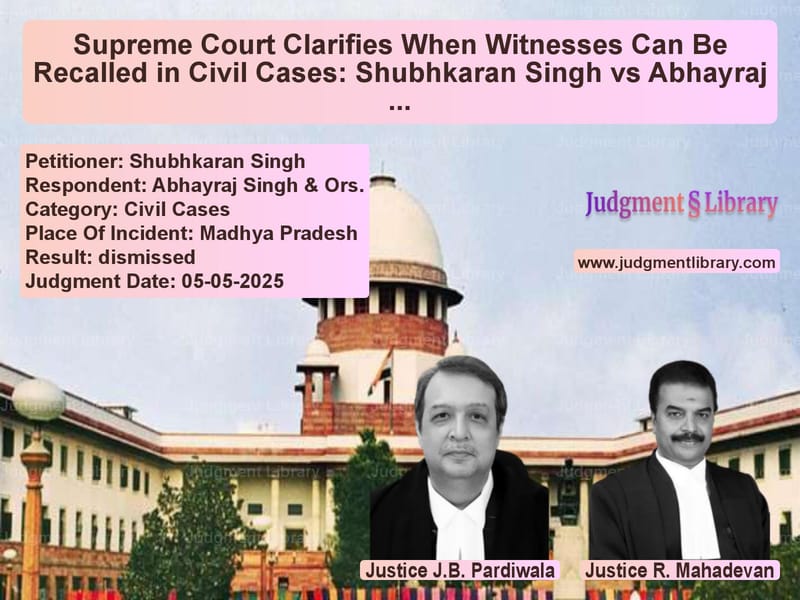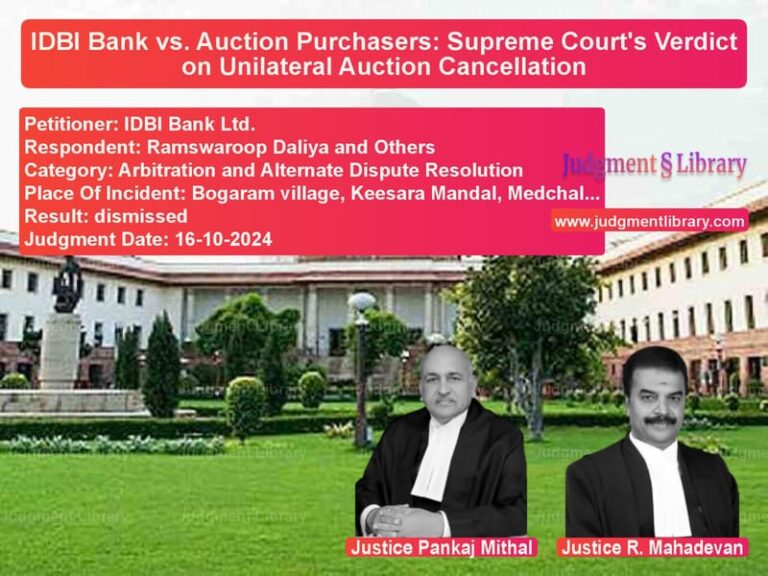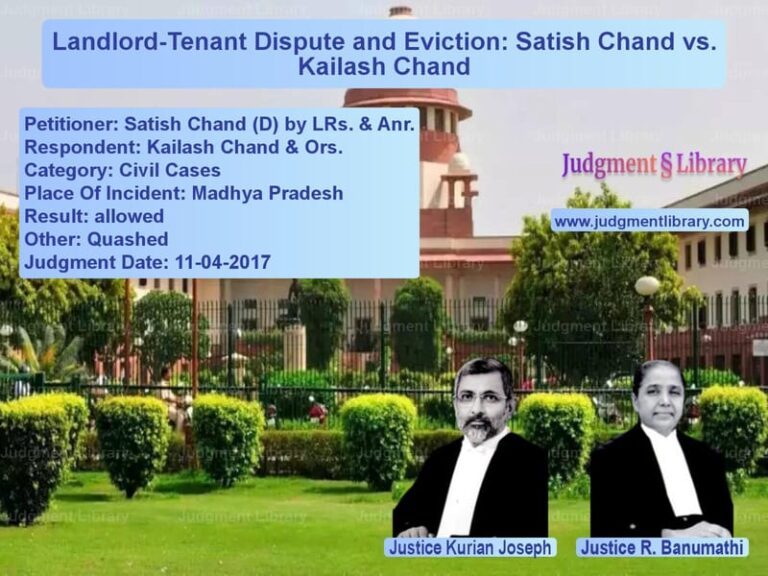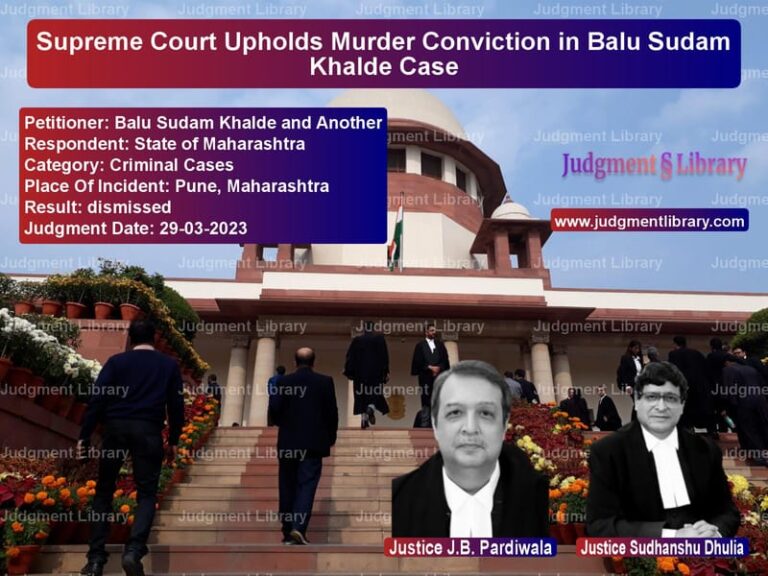Supreme Court Clarifies When Witnesses Can Be Recalled in Civil Cases: Shubhkaran Singh vs Abhayraj Singh
In a significant ruling that clarifies the boundaries of judicial discretion in civil proceedings, the Supreme Court of India recently delivered an important judgment on the scope and limitations of recalling witnesses in ongoing cases. The case of Shubhkaran Singh versus Abhayraj Singh & Others, decided on May 5, 2025, provides crucial guidance on when courts can exercise their power to recall witnesses and when such requests should be denied to prevent misuse of legal processes.
The legal dispute began when Shubhkaran Singh filed a petition under Order 18 Rule 17 of the Civil Procedure Code (CPC) before the High Court of Madhya Pradesh at Jabalpur. This provision deals with the power of courts to recall witnesses who have already been examined during trial proceedings. When the High Court rejected his petition through its order dated January 7, 2025, and subsequently dismissed his review petition on February 27, 2025, Shubhkaran Singh approached the Supreme Court through special leave petitions challenging both orders.
The core legal question before the Supreme Court centered on the interpretation and proper application of Order 18 Rule 17 of the CPC. This rule states: “The Court may at any stage of a suit recall any witness who has been examined and may (subject to the law of evidence for the time being in force) put such questions to him as the Court thinks fit.” At first glance, this provision might seem straightforward, but its application has been the subject of numerous legal interpretations over the years.
The petitioner, Shubhkaran Singh, through his learned counsel, argued that the High Court should have exercised its discretion to allow the recall of witnesses in his case. While the specific arguments presented by the petitioner’s counsel are not detailed in the Supreme Court’s order, the context suggests that the petitioner sought to recall witnesses for further examination or to present additional evidence that he believed was crucial to his case.
The respondents, represented by Abhayraj Singh and others, likely opposed the petition on grounds that recalling witnesses at a late stage would delay the proceedings and that the petitioner’s request did not meet the legal standards for such extraordinary relief. They probably argued that the petitioner was attempting to fill gaps in his case that should have been addressed during the regular examination of witnesses.
The Supreme Court, comprising Justices J.B. Pardiwala and R. Mahadevan, delivered a comprehensive analysis of the legal principles governing the recall of witnesses. The Court began by explaining the fundamental nature of the power under Order 18 Rule 17, stating that “This Rule provides the Court with a power which is necessary for the proper conduct of a case. If it appears to a court trying the suit at any stage of the proceedings that it is necessary to recall and further examine a witness it can always do so. This power can be exercised even at the stage of writing a judgment by the court.”
However, the Court immediately cautioned against the liberal use of this power, emphasizing that “it is, however, proper that this power should not be exercised lightly and the rule is that it should be used sparingly and in exceptional cases only. The power is to be used for removing ambiguities, for clarifying the statement and not for the purposes of filling up the lacuna in a party’s case.” This distinction between clarifying evidence and filling lacunae became the central theme of the Court’s analysis.
The Supreme Court further clarified the relationship between Order 18 Rule 17 of the CPC and Section 165 of the Indian Evidence Act, noting that “If the provisions of Order 18 Rule 17 are read along with the provisions of Section 165 of the Evidence Act it is clear that the power to recall and re-examine a witness is exclusively that of the court trying the suit. The parties to the suit cannot take any objection to the question asked nor can they be permitted to cross-examine any witness without the leave of the court.”
In a crucial clarification, the Court explained that “the said rule, in our opinion, makes it abundantly clear that the right to put questions to the witness recalled under Rule 17 is given only to the court and even cross-examination is not ordinarily permitted on the answers given to such questions, without the leave of the court. Under that rule therefore, a witness cannot be recalled at the instance of a party for the purpose of examining, cross examining or re-examining, and that rule is not intended to serve such purpose.”
The Supreme Court reinforced its interpretation by referencing the case of Sultan Saleh Bin Omer v. Vijayachand Sirmal, where it was observed that “A close reading of this rule makes it obvious that the right under that Rule to put question at any stage or a suit or recall any witness for that purpose, is given to the Court. The court can put questions to the witness recalled, and no cross-examination is ordinarily allowed upon the answers to the questions put by the Judge without leave…….. It cannot therefore be said that an opportunity to a party to recall any witness for the purpose of examining cross-examining or re-examining is governed by O. 18, R. 17 C.P.C.”
The Court did acknowledge that parties could seek to recall witnesses through other legal avenues, noting that “if circumstances warrant, an opportunity to a party to re-call a witness for examining, cross-examining or re-examining can be granted by a Court in the exercise of its inherent jurisdiction under Section 151 C.P.C.” However, this too would be subject to strict judicial scrutiny.
The Supreme Court placed significant reliance on its earlier decision in Vadiraj Naggappa Vernekar v. Sharadchandra Prabhakar Gogate, where it was held that “The power under the provisions of Order 18 Rule 17 CPC is to be sparingly exercised and in appropriate cases and not as a general rule merely on the ground that his recall and reexamination would not cause any prejudice to the parties. That is not the scheme or intention of Order 18 Rule 17 CPC.”
Perhaps the most comprehensive guidance came from the Court’s reference to K.K. Velusamy v. N. Palanisamy, where it was explicitly stated that “Order 18 Rule 17 of the Code is not a provision intended to enable the parties to recall any witnesses for their further examination-in-chief or cross-examination or to place additional material or evidence which could not be produced when the evidence was being recorded. Order 18 Rule 17 is primarily a provision enabling the court to clarify any issue or doubt, by recalling any witness either suo motu, or at the request of any party, so that the court itself can put questions and elicit answers.”
The Court in Velusamy had further cautioned that “The power under Section 151 or Order 18 Rule 17 of the Code is not intended to be used routinely, merely for the asking. If so used, it will defeat the very purpose of various amendments to the Code to expedite trials. But where the application is found to be bona fide and where the additional evidence, oral or documentary, will assist the court to clarify the evidence on the issues and will assist in rendering justice, and the court is satisfied that non-production earlier was for valid and sufficient reasons, the court may exercise its discretion to recall the witnesses or permit the fresh evidence.”
The Supreme Court also highlighted the practical safeguards that courts should implement when exercising this power, noting that they should “award appropriate costs to the other party to compensate for the delay. Secondly, the court should take up and complete the case within a fixed time schedule so that the delay is avoided. Thirdly, if the application is found to be mischievous, or frivolous, or to cover up negligence or lacunae, it should be rejected with heavy costs.”
After this comprehensive analysis of the legal principles, the Supreme Court concluded that the High Court had correctly applied the law in rejecting the petitioner’s application. The Court found that the petitioner’s request did not meet the stringent standards required for recalling witnesses under Order 18 Rule 17 of the CPC. Consequently, “In view of the position of law as explained aforesaid, the Special Leave Petitions stand dismissed.”
This judgment serves as an important reminder of the delicate balance courts must maintain between ensuring complete justice and preventing the misuse of legal processes. By clearly delineating the boundaries of Order 18 Rule 17, the Supreme Court has provided valuable guidance to lower courts while reinforcing the principle that civil litigation must proceed efficiently and without unnecessary delays. The ruling emphasizes that the recall of witnesses is an extraordinary measure reserved for genuine clarifications rather than an opportunity for parties to strengthen weak cases or remedy earlier oversights in their evidence presentation.
Petitioner Name: Shubhkaran Singh.Respondent Name: Abhayraj Singh & Ors..Judgment By: Justice J.B. Pardiwala, Justice R. Mahadevan.Place Of Incident: Madhya Pradesh.Judgment Date: 05-05-2025.Result: dismissed.
Don’t miss out on the full details! Download the complete judgment in PDF format below and gain valuable insights instantly!
Download Judgment: shubhkaran-singh-vs-abhayraj-singh-&-ors-supreme-court-of-india-judgment-dated-05-05-2025.pdf
Directly Download Judgment: Directly download this Judgment
See all petitions in Evidence Law
See all petitions in Judgment by J.B. Pardiwala
See all petitions in Judgment by R. Mahadevan
See all petitions in dismissed
See all petitions in supreme court of India judgments May 2025
See all petitions in 2025 judgments
See all posts in Civil Cases Category
See all allowed petitions in Civil Cases Category
See all Dismissed petitions in Civil Cases Category
See all partially allowed petitions in Civil Cases Category







